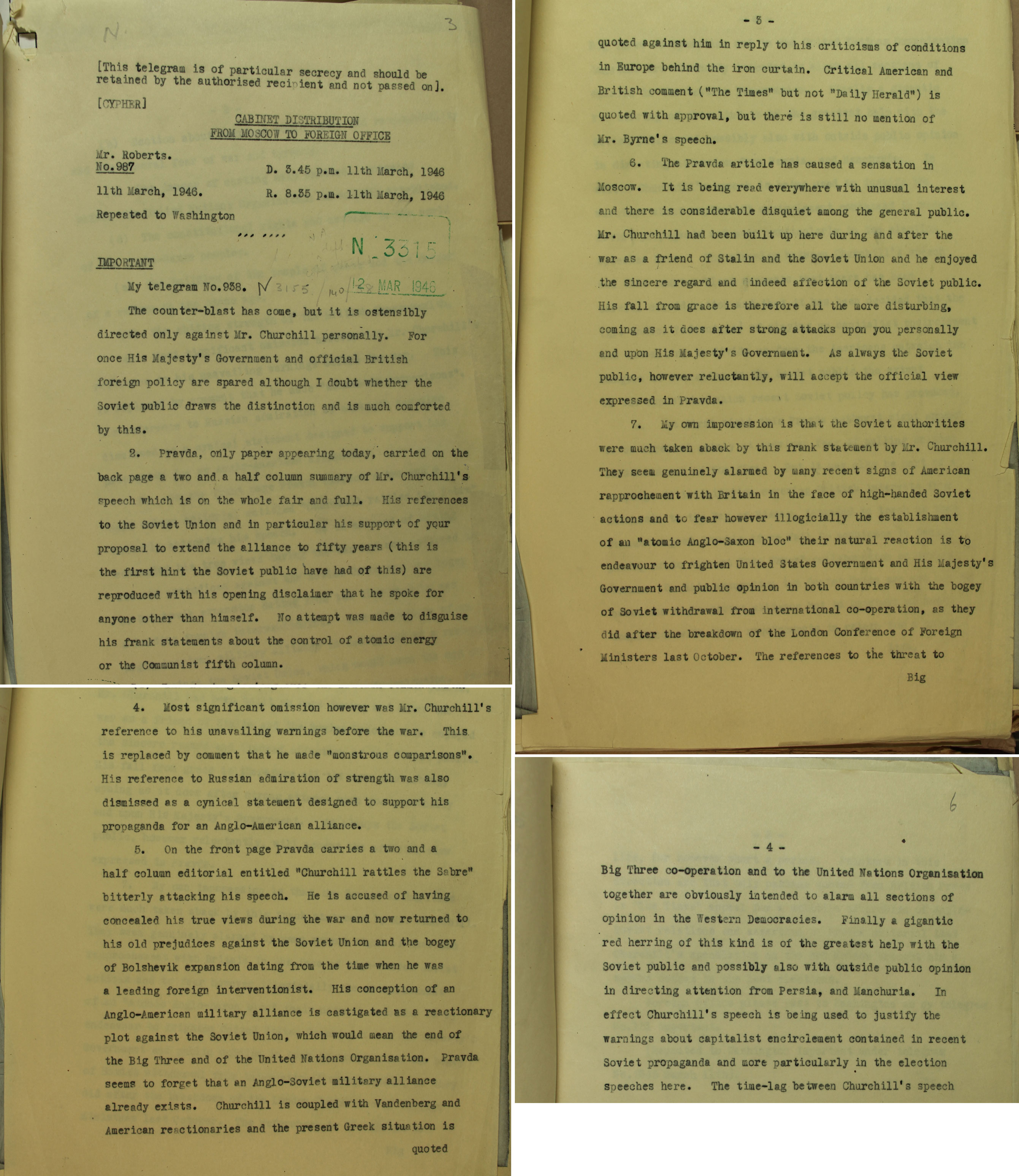
Foreign Office telegram from Moscow on the reaction to Churchill’s speech in the USSR (Catalogue ref: FO 371/56781)
Transcript
[This telegram is of particular secrecy and should not be retained by the authorised recipient and not passed on.]
[CYPHER]
CABINET DISTRIBUTION FROM MOSCOW TO FOREIGN OFFICE
Mr. Roberts
No.987 D. 3.45 p.m. 11th March, 1948
11th March, 1948 R. 8.35 p.m. 11th March, 1948
Repeated to Washington
………………
Important
My telegram No.938
The counterblast [to Churchill’s speech] has come, but it is ostensibly directed only against Mr. Churchill personally. For once His Majesty’s Government and official British foreign policy are spared although I doubt whether the Soviet public draws the distinction and is much comforted by this.
- Pravda, only paper appearing today, carried on the back page a two and a half column summary of Mr. Churchill’s speech which is on the whole fair and full . His references to the Soviet Union and in particular his support of your proposal to extend the alliance to fifty years (this is the first hint the Soviet public have had of this) are reproduced with his opening disclaimer that he spoke for anyone other than himself. No attempt was made to disguise his frank statements about the control of atomic energy or the Communist fifth column.
….
- Most significant omission however was Mr Churchill’s reference to his unavailing warnings before the war [when Churchill warned of the dangers of Hitler and opposed Appeasement]. This is replaced by comment that he made ‘monstrous comparisons’ [ie comparing the USSR in the 1940s with Germany in the 1930s]. His reference to Russian admiration of strength was also dismissed as a cynical statement designed to support his propaganda for an Anglo-American alliance.
- On the front page Pravda carries a two and a half column editorial entitled “Churchill rattles the sabre [threatens war]” bitterly attacking his speech. He is accused of having concealed his true views during the war and now returned to his old prejudices against the Soviet Union and the bogey of Bolshevik expansion dating from the time when he was a leading foreign interventionist. His conception of an Anglo-American military alliance is castigated as a reactionary plot against the Soviet Union, which would mean the end of the Big Three and of the United Nations Organisation. Pravda seems to forget that an Anglo-Soviet military alliance already exists. Churchill is coupled with Vandenberg and American reactionaries and the present Greek situation is quoted against him in reply to his criticisms of conditions in Europe behind the iron curtain. Critical American and British comment (“The Times” but not the “Daily Herald”) is quoted with approval, but there is still no mention of Mr. Byrne’s speech.
- The Pravda article has caused a sensation in Moscow. It is being read everywhere with unusual interest and there is considerable disquiet among the general public. Mr Churchill had been built up here during and after the war as a friend of Stalin and the Soviet Union and he enjoyed the sincere regard and indeed affection of the Soviet public. His fall from grace is therefore all the more disturbing coming as it does after strong attacks upon you personally and upon His Majesty’s Government. As always the Soviet public, however reluctantly, will accept the official view expressed in Pravda.
- My own impression is that the Soviet authorities were much taken aback by this frank statement by Churchill. They seem genuinely alarmed by many recent signs of American rapprochement with Britain in the face of high-handed Soviet actions and to fear however illogically the establishment of “an Anglo-Saxon bloc” their natural reaction is to endeavour to frighten United States Government and His Majesty’s Government and public opinion in both countries with the bogey of Soviet withdrawal from international-co-operation, as they did after the breakdown of the London Conference of Foreign Ministers last October. The references to the threat to Big Three co-operation and to the United Nations Organisation together are obviously intended to alarm all sections of opinion in the Western Democracies. Finally a gigantic red herring of this is of the greatest help with the Soviet public and possibly also with public opinion in directing attention from Persia, and Manchuria. In effect Churchill’s speech is being used, to justify the warnings about capitalist encirclement contained in recent Soviet propaganda and more particularly in the election speeches here.
…
